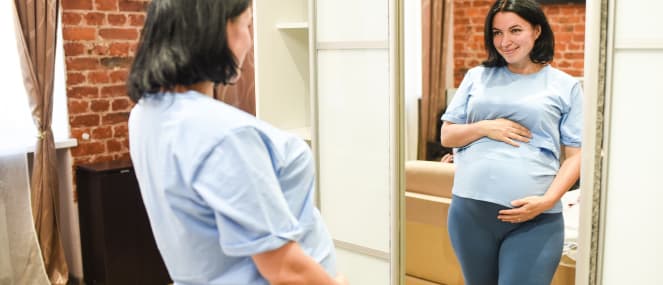
- Health hub/
- Resources for Pregnancy and Preconception/
- Why More Women Are Choosing to Have Babies Later in Life?


A global pattern has emerged over the past several decades, with women increasingly having babies later in life.
Recent data from the Australian Bureau of Statistics reveals this trend in Australia. Emily Walter, ABS head of demography, said, "Today's data continues a trend we've seen in births over the last 40 years, with the average age of both mothers and fathers steadily increasing since the mid-1970s.
"In 1975, less than 20 per cent of births were to mothers between 30 and 39 years old, but now nearly 60 per cent of births are to mothers in this age group."
The chance of conceiving lowers dramatically after the age of 35, and there is a higher risk of pregnancy and birth complications. Yet there are reasons women still choose to delay having their first child until this age or even beyond. In addition, this extra time means women can prepare in various ways to maximise their likelihood of conceiving.
Reasons and benefits of delayed motherhood
The ABS also reports that this shift towards older parenthood largely follows from young people tending to reach the milestones that usually precede parenthood later than in previous decades. These milestones include leaving the parental home, gaining economic independence, and marrying or forming long-term de facto relationships.More career opportunities for women
Over the years, an increase in career opportunities for women has opened, including those in fields of work where women traditionally don't usually work. This has meant women have the choice of pursuing their careers or starting a family. The optimal fertile age for women is in their late 20s and early 30s when they are busy pursuing their careers. Women are also spending time educating themselves, gaining certifications and degrees, and progressing their career ambitions.Taking the time to find the right partner
Another major factor impacting women's decision to have children later is that they are now taking more time to find the right partner. The decline in partnership rates is discussed in the Australian Institute of Family Studies report "It's not for lack of wanting kids" as one explanation for Australia's fall in fertility rates. Several authors of the research suggest that the likely explanation could be that "The formation and continuation of a relationship have become increasingly contingent on the ability of the relationship to meet emotional needs rather than to meet financial or practical needs or to conform to social pressure."
The report suggests that people are very concerned about their capacity to be good parents and to provide their children with the emotional security that comes from a secure relationship.
The analysis suggests that while most people want to have children, the most common pre-conditions people nominate for having them are a secure, stable, adequate partner and a secure, stable, and adequate income stream.
Financial stability
The AIFS report found both men and women were particularly likely to emphasise the ability to support a child financially as the most important issue when considering having children. With the expansion of career opportunities. women have the chance to build a solid financial foundation before they settle down to start a family.Changes in societal expectations
There has been a shift in societal expectations in that women are no longer expected to follow the traditional timeline of getting married, buying a house, and having children at a young age. Greater diversity in family structures now exists, including de-facto couples, mothers having children on their own, and families with fewer children than before.
The AIFS report discusses how a diversity of lifestyles and general aspirations means that 'having kids, while a priority, often comes after having met some other priorities, or 'pre-conditions'.
Women now understand they can spend time on personal development such as understanding their purpose before settling with a partner.
Advances in technology and health
With the increased availability of reproductive technologies such as IVF egg freezing and contraceptive options, women have greater control over when they would like to have children.Health consideration of having children later in life
Women are born with a set number of eggs, and as each year goes by, these eggs and the quality of the eggs deplete, leading to a decline in fertility. Menopause usually happens around age 45 to 55, according to the World Health Organisation, at which point women are no longer fertile.
Increased risk of complications
Having children later in life comes with an increased risk of pregnancy and birth complications. For example, research in 2017 found advanced maternal age is associated with an increased risk of caesarean birth.
Prenatal testing is highly recommended, especially for people of older ages, to screen for any risks with going ahead with a pregnancy. A pregnancy of advanced maternal age may be monitored more closely.
With fewer and older eggs, these also carry an increased risk of chromosomal abnormality, which can lead to complications at birth and development of the child.
The increased risk of general health issues that come with increasing age can affect pregnancy and delivery.
How can women improve fertility naturally after 35?
Going back to the basics of leading a healthy lifestyle can all contribute to optimising fertility and lowering your risk of pregnancy complications. These steps consist of a nutritious diet, exercise, managing stress, reducing alcohol, quitting smoking, maintaining a healthy weight, and keeping up with regular medical check-ups.
Getting advice early from your GP, even if you are thinking about pregnant, can help you receive information about how to nurture your fertility.
Parenting as an older mother
The positive side of having a child later in life is having more life experience and skills, such as coping skills and resilience, which can be valuable for parenting.
Settling down with a partner later in life and finding the right match, contributing towards a stable family environment.
One 2016 study found that older mothers can parent in ways that contribute to a positive psychosocial environment due to their increased emotional and psychological maturity. For example, they were less likely to punish and scold their children while raising them.
Finally, an older mother will likely have increased financial security and stability as she has more work experience.
Although you may think it's too late or you're too old to have a baby, the age at which women are having babies is increasing. Aside from your age, your health is important to optimal fertility.




